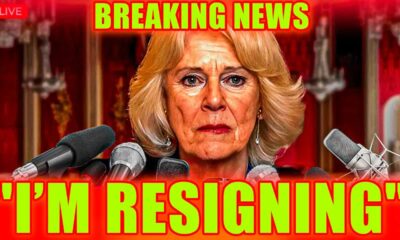The News
Queen Camilla Returns to Royal Duties After Health Scare
Queen Camilla has made a welcome return to her royal responsibilities, sharing a positive health update following a recent illness.
The 77-year-old monarch attended her first official engagement after recovering from a troublesome chest infection, expressing that she is feeling much better.
Her determination to fulfill her royal duties was evident as she met this year's Booker Prize finalists, despite still experiencing some lingering symptoms.
Arriving at the garden room of Clarence House just after 2 p.m., Queen Camilla was greeted by Gabby Wood, the chief executive of the Booker Prize Foundation.
When asked about her health, the Queen responded with optimism, saying, “I'm improving,” while acknowledging a slight cough.
Her commitment to attending the event showcased her dedication to her role, even amidst health challenges.
Prioritizing her recovery, the Queen had previously missed several remembrance events over the weekend on her doctor's advice.
She also made the difficult decision to skip the star-studded premiere of Gladiator 2 and the celebrations for King Charles' 76th birthday.
This choice reflected her desire to ensure a full recovery and protect the health of others around her.
Dressed elegantly in a white frilled collar shirt and a black pinafore, Queen Camilla warmly welcomed Ms. Wood and Edmund Duvall, chair of the 2024 judging panel.
She posed for photographs with the six literary finalists and engaged in brief conversations, sharing her admiration for their work.
Though she coughed occasionally during the event, her spirit remained high as she interacted with each finalist.
Percival Everett, a returning finalist, expressed his gratitude for her attendance and inquired about her health.
The Queen reassured him, stating, “I'm on the mend.
These things take time, but I'm hopeful.”
Her discussions with Mr. Everett and Rachel Kushner highlighted the significance of their literary achievements, with the Queen humorously clarifying that skill, not luck, was key to their success.
Reflecting on her recent trip to Australia with the King, Queen Camilla shared how warmly they were welcomed in Sydney.
Her enthusiasm was palpable as she discussed the impressive number of women among the finalists, noting that only one male contender was present.
Before departing, Ms. Wood thanked the Queen for her longstanding support of literature, to which she replied, “It's always been my passion.”
The Queen's love for reading has driven her commitment to promoting literacy and education.
Her relationship with the Booker Prize is well-established; she has attended numerous awards ceremonies since its inception in 1969.
The prestigious award offers a £50,000 prize to the winner, while each of the six shortlisted authors receives £2,500.
This event marked Queen Camilla's first official engagement since returning from her tour of Australia and Samoa, which wrapped up on October 26th.
Her schedule for the week has been adjusted to allow for a gradual return to public life, with plans to attend a palace reception celebrating the TV and film industry.
However, she is expected to leave early.
In other royal news, an Australian senator named Lydia Thorpe has stirred controversy after interrupting King Charles during his recent speech in Australia.
Thorpe, the first Aboriginal senator from Victoria, confronted the monarch, accusing the royal family of genocide against Indigenous Australians.
Her bold actions have sparked significant debate about the monarchy's role in Australia's colonial past.
Following her outburst, the Australian Senate voted to censure Thorpe, but she remains unapologetic.
In fact, she publicly ripped up the censure motion, vowing to continue her protests against colonialism.
Thorpe's defiance has ignited a broader discussion about Australia's relationship with the British monarchy and the ongoing struggles faced by Indigenous communities.
While some condemn Thorpe's actions as disrespectful, others view her as a voice for the historically oppressed.
The senator's protest has highlighted the urgent need for acknowledgment of the injustices faced by Indigenous peoples.
The censure and Thorpe's response reveal a deep divide in Australian society regarding the legacy of colonialism and the monarchy's influence.
As the discourse surrounding these events continues, it's clear that both Queen Camilla's return to royal duties and Lydia Thorpe's protests are pivotal moments in shaping contemporary discussions about identity, history, and the future of Australia.
The intersection of royal engagements and political activism underscores the complexities of navigating tradition and change in a modern context.


















































































